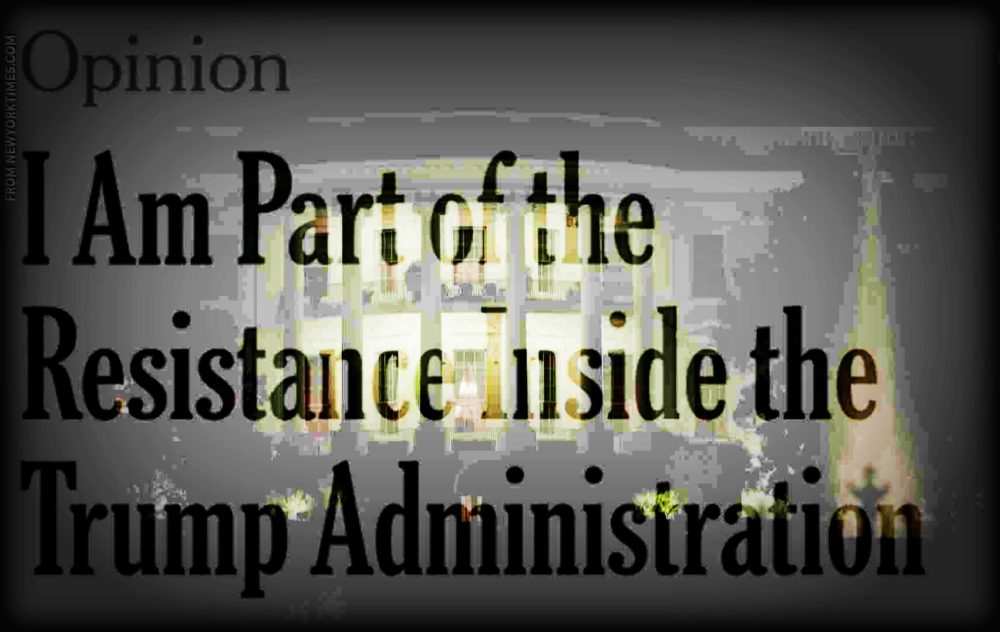On September 5, the New York Times published an anonymous op-ed piece written by a Trump administration official. The author explains how administration officials deal with Trump’s leadership style by saying, “Many of the senior administration officials in his (Trump’s) own administration are working diligently to frustrate parts of his agenda and his worst inclinations. I would know, I am one of them.”
The anonymous op-ed also explains that President Trump doesn’t really support Republican or conservative ideas such as being an independent thinker and supporting the idea of an economic free market. The author states various administration officials have expressed disbelief at some of the president’s comments and actions regarding his policy proposals. The anonymous op-ed dives into detail about how Trump approaches the day to day duties of the presidency. “Meetings with him veer off topic and off the rails,” the author explains. “He engages in repetitive rants, and his impulsiveness results in half-baked, ill-informed and occasionally reckless decisions that have to be walked back.”
However, the op-ed notes that not all the stuff Trump has done is bad, citing that there’s been “effective deregulation, historic tax reform, and “a more robust military,” during Trump’s tenure in office. Since this op-ed came out, those both inside, as well as outside, the White House are working diligently to try and figure out whom exactly in the administration wrote the much-discussed piece. The identity of the author is only known to the NYT’s op-ed page editor Jim Dao, and a small number of people within the Times’.
Vendetta:
The Vendetta here was the decision to run this piece ethical or not. The NYT has noted that it rarely publishes anonymous op-ed articles, but they explained that in this particular case, they gave the green light to publish this piece because they thought that the article provided an important perspective to its readers.
The Washington Post’s editorial page editor Fred Hiatt, claimed that the Post wouldn’t have ran the op-ed piece if the author contacted them first. Ruth Marcus, the Post’s deputy editorial page editor, wasn’t sure if she would’ve approved to run the piece either, but she noted that the author should’ve put their name on the article, due to the weight it carried. The Boston Globe, however, said that they would’ve published the op-ed after doing some careful vetting first because it had some newsworthy elements in it. They cited the newsworthy elements as when there was talk amongst those in the administration about using the power of the 25th Amendment, which would remove a president if they become unfit for carrying out the duties of the presidency.
The policy of this issue comes from journalistic ethics when it pertains to anonymous sources. According to the Society of Professional Journalists, or SPJ, reporters need to confirm information for a story as much as possible, before going to an unnamed source for information. SPJ also recommends that before journalists use an anonymous source, they should first try to figure out if the news value of the content that the source has, outweighs whatever the source is trying to accomplish, by putting the information out into the public.
Here are pros and cons to the anonymous op-ed piece by a Trump administration official:
Pros:
- The op-ed piece had a newsworthy value to it.
- The article provided a unique perspective inside the Trump Administration, to NYT’s readers.
- The article was timely and current with regards to recent questions about Trump’s fitness for presidency.
Cons:
- The NYT took a risk in publishing this op-ed anonymously. The piece has come under scrutiny from President Trump himself, and some in the journalism world.
- It seems to always be a big risk when a major publication like the NYT publishes an op-ed piece of this magnitude, without revealing who wrote it.
- The author of the article could have their own agenda, and may not have written this out of a service to the general public, but possibly to get the president to start acting differently when it comes to governing the country.
Resolution:
Some policy options on this topic could be to have and practice some good journalistic ethics. One good practice of journalistic ethics, when it comes to dealing with anonymous sources is to make sure to carefully vet the source, by making sure that the information that they are disclosing is credible and factual.
There will always be a passionate debate about whether publishing this article from a senior Trump administration official was a good decision for the NYT or not. I believe that it was a good thing for the New York Times to publish this anonymous op-ed piece, mainly because it had a newsworthy value to it. This piece also gave a unique inside perspective on the inner workings of the Trump Administration, and this particular administration official’s thoughts, along with their colleague’s thoughts, on President Trump’s leadership style.
Take Action:
- Poynter Institute: The Poynter Institute’s mission is to teach journalists the value of transparency and accuracy. The Poynter Institute is one of the main leaders in journalism excellence, and they continually help with fact-checking and educating journalists and the public about media ethics. Consider donating to support their mission of having an informed electorate and healthy democracy. https://www.poynter.org/about-us/support-us
- Society of Professional Journalists: The Society of Professional Journalists mission is to protect the First Amendment, and to make sure to promote the free flow of information. Consider making a one-time donation or a monthly donation to the SPJ General Fund, which defends the First Amendment, encourages excellence among journalists, encourages diversity in journalism, and inspires the next generation of journalists. https://www.spj.org/donate-generalfund.asp
- Columbia Journalism Review: The Columbia Journalism Review is a magazine for professional journalists. Its mission is to be a leader in the changing world of journalism. It forms the ideas that make media leaders and journalists smarter about their work. Consider donating to support this mission, as well as help CJR continue its work as a media watchdog and be an advocate for a free press. https://www.cjr.org/about_us/donate.php
References:
- Anonymous. (2018, September 5). I Am Part of the Resistance Inside of the Trump Administration. New York Times. Retrieved from https://www.nytimes.com/2018/09/05/opinion/trump-white-house-anonymous-resistance.html
- Stelter, Brian. (2018, September 6). The story behind the New York Times’ anonymous op-ed blasting Trump. CNNMoney. Retrieved from https://money.cnn.com/2018/09/05/media/new-york-times-resistance-oped-jim-dao/index.html
- Kludt, Tom. (2018, September 6). The anonymity dilemma: New York Times rivals react to explosive op-ed. CNNMoney. Retrieved from https://money.cnn.com/2018/09/06/media/new-york-times-anonymous-op-ed-trump/index.html
4. Farrell, Michael. SPJ Ethics Committee Position Papers: Anonymous Sources. Society of Professional Journalists. Retrieved from https://www.spj.org/ethics-papers-anonymity.asp




